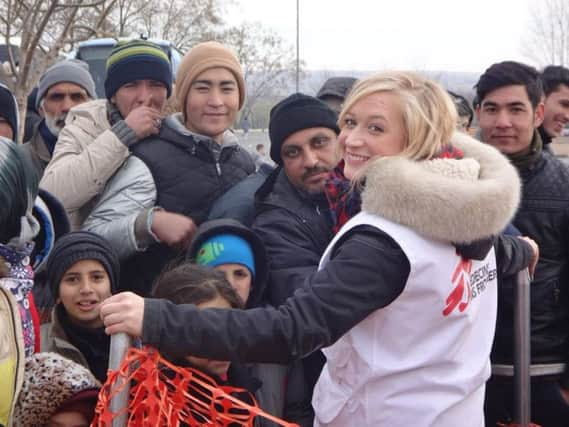Coldstream aid worker tear gassed


A communications manager with Medecins Sans Frontieres (Doctors Without Borders) Gemma has been in Greece since November dividing her time between Idomeni, in northern Greece, Athens and the islands of Lesvos and Kos where the refugees are coming ashore in their hundreds after crossing the Aegean Sea from Turkey.
In recent weeks much of Gemma’s time has been spent at the Greece/Macedonia crossing point in northern Greece which been cause for increasing concern.
Advertisement
Hide AdAdvertisement
Hide AdAs more and more refugees arrive in Greece and start their trek to northern Europe the numbers being allowed through to Macedonia have been reduced and the refugee camp at Idomeni, designed to hold 2000 people, is currently home for 9000 refugees.
Afghanis are no longer allowed to cross and are now stuck in Greece.
One of the Afghan refugees Gemma met in recent days was a former MSF colleague, a nurse who worked in the MSF Kunduz hospital in north Afghanistan for two years until it was destroyed by an airstrike last October killing 14 MSF staff and 24 patients and leaving thousands of people in the region with no medical care.
“Ongoing insecurity, daily bomb blasts and threats to his life/the life of his family led him to flee Afghanistan seeking safety and a better life,” said Gemma.
Advertisement
Hide AdAdvertisement
Hide Ad“He became one of the thousands of refugees who arrived in Greece this year, risking his life and the lives of his children in a dangerous sea crossing only to arrive at the Macedonian border and be told that he and his family cannot cross because they are Afghani. No one should be treated like this.”
Three days before the tear gas event Gemma told the world’s media: “Greece’s ability to accept any more refugees will reach capacity within eight days.”
At the Idomeni refugee camp, as aid agencies like MSF do what they can to provide medical care, food and shelter, the problem continues to get worse. “There are people who have been here for as long as 10 days,” added Gemma. “Things are really stretched to the limit.”
Tensions spilled over on Monday when only 50 people were allowed to cross.
Advertisement
Hide AdAdvertisement
Hide AdGemma said there was “absolutely no warning” beforehand that the Macedonian police were going to fire tear gas.
“I was at the border when the protest was happening. We heard three or four loud explosions and initially we thought it was a smoke grenade.
“Then a gust of wind blew it and that’s when we realised it was tear gas.”
Gemma was standing next to Greek police officers at the time and said the crowd immediately scattered, many running to the MSF clinic nearby. Everyone, including Gemma, the police officers, journalists and refugees were affected by the tear gas.
Advertisement
Hide AdAdvertisement
Hide Ad“Some people had passed out because of the tear gas,” she said. “We have treated 22 severe cases immediately after, then 23 cases later which were less severe. The youngest was six weeks old.
“We had a four year old who was unconscious for 45 minutes after the attack. Medical staff think it was through trauma because they had fled Aleppo.”